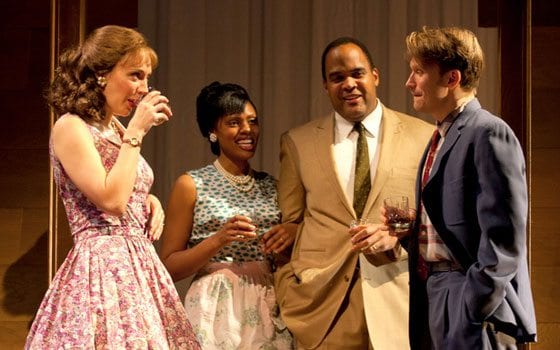
A house-buying 1950’s Chicago black family fends off white racists in the strong Lorraine Hansburry drama “A Raisin in the Sun.” Now an early 2000’s black homeowner Hannah Davis struggles to keep an Irish couple from claiming her suburban Boston home in Kirsten Greenidge’s new play “The Luck of the Irish.”
Much more than a follow-up to Hansberry’s work, “The Luck of the Irish” is a highly personal work, inspired by the experience of Greenidge’s own grandparents. As she reveals in a Huntington Theatre Company note, Greenidge decided to write plays after seeing that company’s production of August Wilson’s “Joe Turner’s Come and Gone.”
Very fittingly, Huntington Theatre Company is staging the world premiere of “The Luck of the Irish” (extended through May 6 at the Calderwood Pavilion,Boston Center for the Arts ). The very well-written result, brilliantly directed by Melia Bensussen, proves that Greenidge’s decision was as sound as her writing.
The pivotal backstory of that writing is the purchase of Hannah’s house by her grandparents Lucy and Rex Taylor with the assistance of the Donovans, the Irish couple now arriving with claims 50 years later. Because white families routinely refused to sell a home to a black couple, the Taylors — as with Greenidge’s own grandparents — resorted to a practice known as “ghostbuying” to conceal the racial identity of the buyers from the sellers.
Just as “A Raisin in the Sun” speaks about a lot more than overcoming the bigotry of neighboring homeowners, “The Luck of the Irish” centers on much more than a fight between black and white couples over property.
Greenidge –- as with Wilson and his characters in “Joe Turner’s Come and Gone” — vividly establishes the rich character of both Hannah and her close sister Vanessa as well as the integrity and inner strength of the grandparent Taylors.
Moving smoothly back and forth between the pre-Civil Rights legislation 1950’s and the much more enlightened though far from ideal early 2000’s, she depicts both generations as African Americans with a totally self-determined inner life.
Will the Donovans ever respect them and that inner life? Tellingly, Joe seems to identify somewhat with the Taylor’s and the Davis’ dreams for a better life. He repeatedly speaks of college study –which becomes a kind of metaphor for greater understanding between people. Unfortunately, wife Patty appears to have no dreams outside of her obsession with the house. That house, beautifully rendered in rich wood by scenic designer James Noone and radiantly lit by Justin Townsend, becomes a kind of character itself over and above its power as a metaphor for self-empowerment.
The Huntington cast are equally empowered. Francesca Choy-Kee captures Hannah’s warmth as well as her warrior-like demeanor in confronting the older Donovans.
Her dialogue with Shalita Grant — winning as free spirited Vanessa – has the kind of vitality one finds in Wilson’s best work. Nikkole Salter has all of Lucy’s elegance, and Victor Williams establishes Rex’s deep love for her with smart understatement.
Curtis McClarin is properly unflappable as Hannah’s weasy-going husband Rich. At a post-performance talkback, this critic discovered that McClarin himself opted for touching a door top on leaving his house. That repeated touching becomes an evocative motif, much like the kissing of a mezuzah by a Jewish homeowner. Mrianna Bassham has plenty of attitude as the younger Patty, and Nancy E. Carroll is powerful as the older Patty. Both McCaleb Burnett as the younger Joe and Richard McElvain as the older Joe make the most of the husband’s ambivalence about trying to claim the house.
Boston theatergoers should put their bets on “The Luck of the Irish.” Kirsten Greenidge has written an eloquent and moving play, and the Huntington Theatre Company is staging it with as much loving care as it brings to the work of August Wilson.






